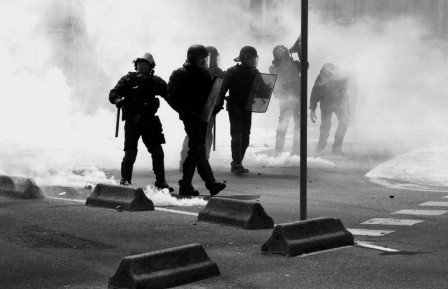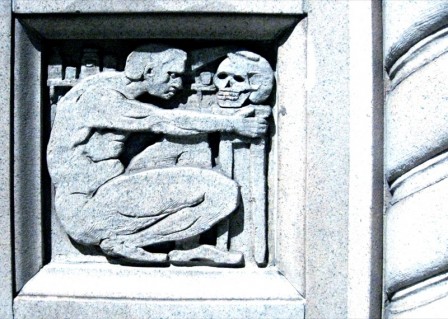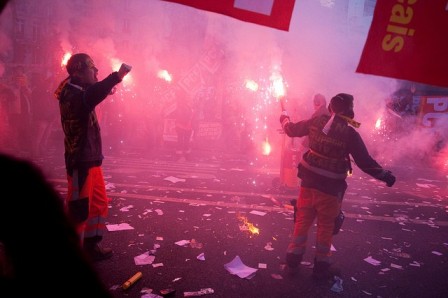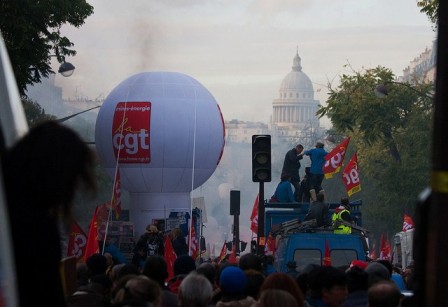Reactions To Austerity: Passivity In The UK, Strikes And Riots In France
France and Britain are not separated by much geographically, but politically the reactions of British and French people are a study in contrast. Today, the British government of David Cameron announced the most drastic budget cuts in decades. Meanwhile, in France the popular protests over a much more timid plan to raise the retirement age from 60 to 62 intensified. And while the severe austerity measures in the UK are not, at least yet, bringing protests to the streets, in France the strikers are calling the shots by paralyzing the country.
Biggest UK Spending Cuts Since World War II
Today, the British government revealed a four year spending cut plan, the most “ambitious” so far in Europe, that will affect all sectors of the British economy, especially the public sector. According to the British Treasury, the deep cuts are “an urgent priority to secure economic stability at a time of continuing uncertainty in the global economy and put Britain’s public services and welfare system on a sustainable long term footing.”
The plan says that the current government has inherited “one of the most challenging fiscal position in the world”. In effect, Britain’s deficit has reached the largest level in the country’s peacetime history. Britain currently borrows one pound for every four it spends. The UK currently spends 43 billion pounds on debt interests alone. David Cameron’s conservative government argues that “failure to take action now would put the recovery at risk, and place an unfair burden on future generation”.
“The Spending Review makes choices. Particular focus has been given to reducing welfare costs and wasteful spending. This has enable the coalition government to prioritize the NHS, schools, early years provision and the capital investments that support long term economic growth, setting the country on a new path towards long term prosperity and fairness. As a result of these choices, departmental budgets other than health and overseas aid will be cut by an average of 19 percent over four years,” says the summary of the Spending Review prepared by the British Treasury.
The key point of the drastic cuts announced today will be as followed: Around 500,000 public sector jobs likely to be lost; an average 19 percent four-year cut in departmental budgets; 7 billion pounds cuts from additional welfare budget; police funding cut by 4 percent a year; retirement age to rise from 65 to 66 by 2020. The overall goal is to eliminate the structural budget deficit by 2015.
However, even if the British streets were sedated today, the plan got a raucous reception from the opposition Labour party in the House of Commons. The Labour opposition called the plan “reckless”.
“The Spending Review is a reckless gamble with people’s livelihoods which risked stifling the fragile recovery,” said Alan Johnson from the Labour party. Other critics of the plan are coming from the British media. “The cuts to the welfare benefit are regressive, in the most basic sense of costing families in the lower half of income distribution,” said Stephanie Flanders from the BBC.
Effectively, the middle class and the poor in Britain will pay the price for the cuts, and will be left holding the bag for the follies of global capitalism. The new welfare savings come from gutting unemployment programs by abolishing employment and support allowance which replaces incapacity benefit after one year. Two billion pounds will be saved this way on the back of the unemployed.
Meanwhile, on the other side of the British Chanel, the situation could not be more different.
France: The Revolt Continues Despite Sarkozy’s Heavy Police Crackdown
The French strikers are not backing down, and have even tightened the blockades of fuel depots. In Paris, masked youths clashed with police today in the poor suburb of Nanterre, and students gathered outside the Senate. The French Upper Chamber will vote on raising the retirement age from 60 to 62 before the end of the week.
So far, only in Lyon, 60 police officers have been injured in clashes with rioters. Meanwhile, the approval rating of President Sarkozy is at a new low. According to a poll conducted on October 16, the number of French with either a negative or very negative opinion of Sarkozy stands at 69 percent. Another poll says that 59 percent of French support a continuation of the strike.
The Interior Minister, in charge of Sarkozy’s burgeoning police state, said police already arrested 1,423 alleged rioters over the past week.
“The current situation cannot continue without serious consequences for our life as a society and our economy. But also for the health and safety of our citizens. We will not let the country be blockade, and we will not let the thugs go unpunished,” said Interior Minister Hortefeux at a news conference today.
By “thugs”, Hortefeux was referring to those arrested in street riots or directly getting in the way and confronting French riot police and paramilitary swat teams. Unfortunately, the same “thugs” in revolutionary France circa 1789 were called the Sans-Cullottes, and,at this juncture, it seems that unless the Sarkozy administration caves in, France could heat up and reach a point of no return.
Editor’s Note: To view more photographs by Gabriel Dulac-Arnold click here.
Related Articles

















You must be logged in to post a comment Login